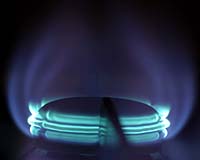 |
Baghdad (UPI) Feb 3, 2009 Iraq looks set to play a key role in the Nabucco pipeline project that will carry natural gas 2,000 miles from the Caspian Sea basin through Turkey to Austria to feed energy-hungry Europe and break Russia's stranglehold. Expansionist Turkey, in a move that signals a new effort to make peace with its Kurdish separatists, has already signed up Iraq's semiautonomous Kurdish enclave to provide 8 billion cubic meters a year for transit. There are several important political issues between Iraq's central government in Baghdad and the government of the Kurdish enclave that have yet to be settled, but for now the focus seems to be on getting the gas flowing and earning badly needed revenue. In the meantime, the European Union's energy commissioner, Andris Piebalgs, signed a memorandum for a strategic energy partnership with Iraqi Oil Minister Hussain al-Shahristani in Baghdad in January. EU energy experts believe Iraq could provide between 5 and 10 bcmy, including the gas from Iraqi Kurdistan. Iraqi Prime Minister Nouri al-Maliki announced last July at a meeting in Ankara of prospective Nabucco users that his country could provide up to 15 bcmy by 2015. That's half the pipeline's planned capacity. Given the woeful state of Iraq's energy infrastructure after four decades of neglect, war and international sanctions, that may be far more than it will be able to produce within that timeframe. Foreign investment is crucial, and obtaining it may involve more leasing auctions similar to those held in Iraq in June and December 2009 to develop 10 of the country's main oil fields. AsiaTimes.online, which provides extensive coverage on energy affairs, notes, "in the very long run, it may turn out that Iraq will supply even greater quantities of gas to Nabucco than already agreed. "Contractual arrangements with Iraq have certainly accelerated past the negotiation stage." Iraq's position is enhanced by a flurry of problems between potential participants in the pipeline project. Turkey's arm wrestling with the energy-rich Central Asian republics of Turkmenistan and Azerbaijan over supplies for Nabucco is a case in point. Turkey, which sees itself as the hub of the planned pipeline and indeed of all energy routes from the Middle East and Central Asia to Europe, wants higher transit revenues and this is riling Azerbaijan. "That contravenes the principle that all parties should pay the same fixed price for each kilometer of pipeline through which their gas flows," according to AsiaTimes.online. Turkey is seeking to convince Azerbaijan "that its participation is not absolutely necessary for Nabucco's feasibility." Turkmenistan has an alternate route for gas exports via Iran, but the U.S.-backed Nabucco project seeks to cut out Iran, as well as Russia, from the energy business in the region. Iraq's participation -- and al-Maliki's eagerness to have Iraq play a major role in the Nabucco project -- has been a boon for its planners. For one thing, if Iraq can provide the gas it says it can that would help overcome one of Nabucco's biggest problems: the lack of committed gas providers to make the project viable. Simon Henderson and Marc Grossman of the Washington Institute for Near East Policy said in a recent analysis on the importance of the Nabucco project that Turkmenistan, Kazakhstan and Iran were not "viable possibilities" as providers for the project. "Using Iranian gas is impossible because of Tehran's pursuit of nuclear weapons; significant political and technological roadblocks prevent getting gas from Turkmenistan and Kazakhstan into a Nabucco pipeline." So, Henderson and Grossman, a former U.S. ambassador to Turkey, concluded that Iraq "is in the right place at the right time" when it comes to Nabucco. They observed that Maliki's offer in Ankara "to supply half of Nabucco's gas shows that Baghdad understands it must convince governments and companies that it is serious about its energy future." "The U.S. administration can do something important to support the Nabucco project by working to make concrete al-Maliki's offer." The pipeline, they said, would help U.S. allies in Europe lessen their dependence on Russian gas and would help Iraq "take another step toward economic success and stability" as U.S. forces withdraw from the country.
Share This Article With Planet Earth
Related Links Powering The World in the 21st Century at Energy-Daily.com
 Natural Gas Supplies Could Be Augmented With Methane Hydrate
Natural Gas Supplies Could Be Augmented With Methane HydrateWashington DC (SPX) Feb 03, 2010 Naturally occurring methane hydrate may represent an enormous source of methane, the main component of natural gas, and could ultimately augment conventional natural gas supplies, says a new congressionally mandated report from the National Research Council. Although a number of challenges require attention before commercial production can be realized, no technical challenges have been ide ... read more |
|
| The content herein, unless otherwise known to be public domain, are Copyright 1995-2010 - SpaceDaily. AFP and UPI Wire Stories are copyright Agence France-Presse and United Press International. ESA Portal Reports are copyright European Space Agency. All NASA sourced material is public domain. Additional copyrights may apply in whole or part to other bona fide parties. Advertising does not imply endorsement,agreement or approval of any opinions, statements or information provided by SpaceDaily on any Web page published or hosted by SpaceDaily. Privacy Statement |